- Home
- Alan Bennett
Alan Bennett: Plays, Volume 1 Page 11
Alan Bennett: Plays, Volume 1 Read online
Page 11
GEORGE: Yes, you have. It’s that bloody dalmatian.
BRIAN: Better hop outside and get rid of it. (Steps outside.)
GEORGE: It’s always here that’s what gets me.
Why is it always us? Why does it always have to do its No.
2’s at No. 17?
BRIAN: It doesn’t happen in Australia. Did you know that? When I went on that extremely boring parliamentary mission to that God-forsaken…
(He comes back.)
… albeit, let it be said Commonwealth country, the thing that impressed me most, lifeguards apart, was the sweetness of the streets.
GEORGE: I reckon it’s sussed we’re the only Socialists in the street. Question that dog closely and you’ll find it reads the Daily Express. If I ever catch it dropping its nasty canine britches round here again I’ll kick it into the middle of next week. And her as well, Mrs Frederick Brodribb.
BRIAN: Ah ah. She sounds like a supporter of the Conservative and Unionist Party. That’s right. Shove the kettle on. I’m exhausted by that gruelling confrontation.
GEORGE: You’re so sensible in many respects but when you actually get down to it, you’re just as bad as the rest of them.
BRIAN: That’s right.
GEORGE: I mean. Let’s be clear what we are talking about. We are talking about the kind of class you can see any day of the week, shambling through Leeds or Nottingham, or Sheffield, shepherded by some broken-down, underpaid, defeated old man of forty-five. The class despises him. The passers-by pity him. He is the secondary school-teacher walking his charges to the baths, traipsing them through art galleries, trying not to see as they shove people off the pavement and make grabs at each other’s balls.
BRIAN: I don’t think you can blame that on Mrs Thatcher.
GEORGE: And on the other side we have a nice little crocodile of grey-flannelled boys with little pink caps and high middle-class voices going home to Children’s Hour and Ballet Shoes and Noel Streatfeild. Which is very nice. Except that these others, they’re going home to get their own teas in Peabody Buildings. They’re going home to margarine adverts and the TV Times, and some of them, quite certainly, a fuck. At thirteen.
BRIAN: Bully for them.
GEORGE: All right. I know I’m being boring. That’s quintessential Toryism. Any trace of passion or concern, they say you’re being boring.
BRIAN: All right. I went to public school, of course. But looking back on it I think it may have been Borstal. I was taught by a succession of teachers all of whom seemed to have lost one or other of their limbs. It was cold, the food was disgusting, there was a great deal of what seemed to me entirely unnecessary running about and the sanitation was such as to make me a lifelong convert to constipation. And I would not send my worst enemy to public school. BUT if there are parents who are prepared to spend money on educating their children in such places … I am not going to stop them any more than I would stop them spending their money on power boats or go-kart racing or any other sophisticated way of throwing money down the drain. It’s a question of freedom.
GEORGE: It is not a question of freedom, it’s a question of justice.
(POLLY comes downstairs, still carrying a pile of children’s clothes, and weanng, as the simplest method of carrying it, a space helmet.
BRIAN kisses her, and she sniffs at him appreciatively,)
POLLY: I was hoping he’d bring you back.
GEORGE: That flaming dog has messed on our steps again. It’s the one species I wouldn’t mind seeing vanish from the face of the earth. I wish they were like the White Rhino-six of them left in the Serengeti National Park, and all males. Do you know what dogs are? They’re those beer-sodden soccer fans piling out of coaches in a lay-by, yanking out their cocks without a blush and pissing against the wall thirty-nine in a row. I can’t stand it.
POLLY: Question is whether you hate the coach party because they’re like the dogs or hate the dogs because they’re like the coach party.
GEORGE: I hate them all. Where did you get that suit from?
BRIAN: It’s old. I got it when I was in the army. Chester, I think.
GEORGE: Why don’t my suits look like that?
BRIAN: Taste.
GEORGE: Not taste. Nothing that implies one cares. It looks like it’s grown on you, that suit. I want something like that, bred in the bone, without anybody thinking I’ve paused before the mirror and chosen it. I want an honest suit of good broadcloth … whatever that is. I want to look like Sir Kenneth Clark or a well-to-do solicitor in a Scottish town or the head of an Oxford college. Such a suit as Montaigne might have worn, had he lived, or Marcus Aurelius.
BRIAN: And something wrong, that’s the mark of real distinction: the tie too loosely knotted, a bit of dinner down the waistcoat.
POLLY: He’s got that anyway.
BRIAN: You should go to my tailor.
GEORGE: There you are, you see. My tailor, my doctor, my dentist. Your servants. With me it’s the tailor, the doctor, the dentist. They’re not mine. And I’m not theirs. Oh, God, if it were only clothes though. Look at this dry pink plate of a face. Why didn’t God give me a face on which the skin hangs in genial brown folds, the mouth is firm … but kindly … and with long large ears. Nearly every man of distinction has long ears. (POLLY and BRIAN involuntarily finger theirs.)
BRIAN: In short you want them to look like one of us and be like one of them.
GEORGE: When I walk down the street I want people to think, ‘There goes a sadder and wiser man.’ Instead of which it’s ‘Christ. He looks a slob.’ Must have a pee.
POLLY: Well, don’t wake the children. George’s trouble is… are you eating … (BRIAN shakes his head.) … he’s a socialist but he doesn’t like people.
BRIAN: Nor do I, much.
POLLY: You’re a conservative. You don’t have to.
BRIAN: No.
POLLY: There’ll doubtless be a bit of something tasty in the oven, cooked by the faithful Mrs Minter. Oh, Brian, it’s a nice life, yours.
BRIAN: I have an ordered life, if that’s nice. All is order. Would you like some cake?
POLLY: I … would I like some cake? No. Why?
BRIAN: In the car there’s a seed cake, a madeira cake, two dozen jam tarts, and various bunches of assorted flowers, stuff I’ve brought back from my constituency.
POLLY: Were you opening a fête?
BRIAN: Not especially. My constituency’s run by a handful of big middle-class ladies. And I am their darling. Miss Cornfield, Miss Venables, Mrs Strickland. They love me.
POLLY: I wish ours was. You never see any of the women, ever. And it’s all beer and butties. All I ever get is black pudding and black looks.
BRIAN: I just wish I had the energy of middle-class women in middle age. They’d organized this sale of work. There they were. Sturdy-legged, freckled-forearmed, horny-elbowed ladies. And the sort of arms that fill with fat, flesh-coloured flesh their flowered frocks.
POLLY: And lots of straying shoulder straps.
BRIAN: Blood donors, cake makers, good mixers, stout old-fashioned cart-horses, ploughing through day after day. Flustered only by sex, and sometimes not even by that. I could do with even a tenth of the energy they devote to flower arrangement. (GEORGE can come back anywhere here.)
POLLY: They’re a vanishing breed.
BRIAN: No. You’re a bit like that.
GEORGE: See!
BRIAN: But why, I kept wondering today. What drives the pistons? What is it that puts one firm-fleshed sensible-shoed leg in front of the other day after day after day? What thoughts do you think flood in as they ease lisle stockings down those massive legs? And in the decency of the bathroom slip into one of Arthur’s old pyjama jackets?
POLLY: It’s like me. Escaping boredom.
BRIAN: Boredom, they don’t know the meaning of the word.
And those firm capable hands. Fingers that can with equal facility bottle gooseberries, address envelopes, arrange peonies, bind wounds, decontaminate (in th
e event of a nuclear attack) an entire village, pray, pry and at life’s end lie freckled and calm upon the sheets with no sense of life wasted or purpose lost. Ο fierce, foolish Tory ladies, I love you. Except that I, your Member of Parliament, your elected representative at the Palace of Westminster am an outrageous pouff.
GEORGE: Get on! Not outrageous at all. About as outrageous as St Augustine.
POLLY: He wasn’t, was he? The sly devil. I’m surprised they never twig.
BRIAN: No. I’m just an agreeable young man who knows how to behave. No, they don’t twig. Mind you, I’ve caught one or two of the 1922 Committee eyeing me uneasily, lest I should suddenly launch myself on their vast pin-striped bottoms. ‘Can’t have pouffs in the Conservative Party. No seat would be safe.’
POLLY: I don’t think they’re human at all, half of them.
BRIAN: Who?
POLLY: The 1922 Committee.
GEORGE: No. A good test is whether you can imagine them on the lavatory. I reckon they just go in there, stand behind the door for five minutes then come out again … just to convince you they’re like everybody else.
BRIAN: It’s a good job I got my seat without having to go through the cattle market. Normally you’re not considered worthy of the trust of the electorate unless you’ve gone under the yoke with one of those upper-class land girls from the front page of Country Life. Your credentials are a brace of spoiled and flaxen-haired children, evidence that you have on at least two occasions hoisted yourself on to her massive thighs. Though quite how this makes one of more use to the Conservative Party I am at a loss to imagine. No. Give me a nice, clean, sad boy of nineteen any day.
GEORGE: Candidates will attend in company with their wives and/or boyfriends. That will be liberalism.
BRIAN: That’s enough anyway. I can’t stand talking about it. Some of them talk about nothing else. It’s like making a career of being five foot eleven.
GEORGE: Brian, you see, is like me. What we both crave in life is order.
POLLY: Marriage and home is order.
BRIAN: Come on. Undies marinating in the basin, no nice cool places in the bed. And kids. There can’t be order where there are children … children are anarchists, booby-trapping the stairs …
GEORGE: Oh, if it were only the stairs. One’s whole life mined with affection and grief and remorse and ingratitude. Perhaps that’s what’s wrong with me … perhaps in the ninth year of my second marriage …
POLLY: Tenth year.
GEORGE: Perhaps in the tenth year of my second marriage I realize too late that I am homosexual by nature. Except that I don’t like men.
POLLY: You don’t like anybody.
GEORGE: Look at Brian. He is still a free man. Look at me … tethered like Gulliver by a thousand tiny ropes to every object in this house. Festooned with the fruit of a hundred visits to the Portobello Road, weighted down with jelly moulds, bread crocks, brass, old photographs. Yes, and children. You’re right, they’re part of it. Objects like the rest, except that they’ve been manufactured on the premises, in this century, in our lifetime and we haven’t quite found a place for them yet. But they’re possessions and ornaments. And they’ve got to be polished in order to do us credit.
POLLY: Here we go again.
GEORGE: Anyway, I can go back to Oxford any time I want.
ENID’S VOICE: Hello?
POLLY: Oh, God, it’s Enid. What’s she doing here? (She runs for the stairs door.)
BRIAN: Who is it? Don’t abandon me. (GEORGE also hides. ENID, POLLY’s mother, enters with a large canvas bag. She is a jolly, slightly raffish lady of about sixty, made up in rather a slapdash way, somewhat Bohemian.)
ENID: Hello, anybody in? It’s me. Oh!
BRIAN: My name’s Lowther, a friend of George’s. I’m his pair. We’ve just been…
ENID: Come again.
BRIAN: In the House. Voting.
ENID: Oh! I’m Enid, her mother. Never a popular person with my daughter, I’m afraid. She’s doubtless just run upstairs?
BRIAN: No. She …
ENID: She generally does. Took the wrong turning somewhere in childhood. Devoted to her father. Hates me. Of course she was denied the breast. It always tells.
(She has eventually put all her belongings down and holds out her hand.)
How do you do. Sorry about the paint stains. I’ve just been to my sex class … well, actually it’s my life class but this term we’re on the nude. We’ve got rather a nice young man posing at the moment. He’s rather a dish. But, I suspect, a nancy. Like everybody else these days. Not that there’s anything wrong in that. More power to his elbow, that’s what I say.
(GEORGE has come out of hiding and crept up behind her.)
I say! There’s a strange hand on my breast. I think I must be being interfered with.
(POLLY comes back.)
GEORGE: Hello, you lovely old Communist.
POLLY: George. Mother. For goodness’ sake. That really is unnatural. George is the only person I know actually to be besotted with his mother-in-law. If everybody was like you, music-hall comedians would go out of business.
GEORGE: They have. We don’t mind, do we, Enid?
ENID: No. We have a disgusting relationship. (Kisses him.) The nicest thing about being old, dear, is that you can do anything you like with a man and nobody thinks you’re flirting.
GEORGE: This has cheered me up. But you never come on a Thursday.
ENID: I’ve got to go to the doctor’s tomorrow so I thought I’d come en route from the Polytechnic. What’re you depressed about?
POLLY: He’s got nothing to be depressed about at all.
ENID: My daughter. A very understanding person. (To BRIAN.) Have you any children?
POLLY: He’s not married.
ENID: He’s quite capable of telling me that himself. He is a Member of Parliament. So domineering. Oh, Polly, look at your verbena toxicana. It’s absolutely parched. And its requirements are minimal. That’s why I chose it.
POLLY: I don’t like cacti. They’re the only plants I don’t like.
ENID: It’s not a cacti. It’s a succulent. Give you a plant and it’s like sending it to the salt mines. Come along now let’s give you a drinkie. That’s better. All gone. All gone.
POLLY: I’ve never been any good with cacti. They need expertise.
ENID: Expertise. One thimbleful of water every blue moon does not constitute expertise. Otherwise we should all be fellows of the Royal Horticultural Society, eh, Mr Lowther?
GEORGE: Let’s have a look at your masterpiece.
ENID: I’m not entirely happy with it. The shoulders are good, you see, but I’ve never quite got the hang of arms. Whereas Zoë, at the next easel, she’s just the reverse. But rather fetching, don’t you think?
GEORGE: I’ll take it on trust.
ENID: And he will insist on not wearing a stitch. Zoe gets quite agitated. Normally, you see, they wear what I believe is called a posing pouch.
POLLY: Oh, Mother.
ENID: Don’t you oh, Mother, me. I know we’re not supposed to be interested at our age. Children always assume the sexual lives of their parents come to a grinding halt at their conception.
POLLY: But you’re so New Statesman and old-fashioned about it. It proclaims your thirties upbringing.
ENID: If that’s the only thing that proclaims my thirties upbringing I think I’m doing very nicely.
POLLY: We’re all emancipated now.
ENID: Not in Stanmore we’re not. Things are very different there. And it’s all very well to sneer at the New Statesman but in the thirties it was the only thing kept one sane. You’re quite shy, aren’t you?
BRIAN: Me? No.
ENID: I think you are. I know one thing. If I had my time over again I wouldn’t have daughters. I’d have geraniums. At least geraniums are grateful. Where’ve I seen you before? Television. I can’t remember what it was you were talking about. You never can on television, can you! More freedom was it, or more control?
Something, anyway. I quite agree, though. Mind you, all we ever watch is the wrestling. I saw a lovely programme the other night. With badgers. No, dolphins. And the D. of Edinburgh. He says dolphins are quite intelligent. And very friendly. But then he’s the D. of Edinburgh so I suppose they would be.
BRIAN: I wish I’d kept my mouth shut.
ENID: Why? It seemed very sensible to me.
BRIAN: Anybody who stands up and says total freedom may not be a good thing is immediately swamped with appreciative letters from old ladies whose twin hobbies are prize cucumbers and the castration of sex offenders.
GEORGE: Exactly. You look round and find you’ve become right marker for the Awkward Squad … evangelists in belted raincoats, defeated prep schoolmasters, hard-mouthed ladies in gay hats ….
BRIAN: Regimental Sergeant-Majors in the WVS.
GEORGE: It’s the S.S., Save Society by Stopping Sex, Stupid Sods.
BRIAN: Opinions come in sets nowadays. You’re either one of us or one of them. Like this.
(He takes out a postcard.)
POLLY: Nice postcard. Victoria Park, Oswestry. There’s no message.
BRIAN: No.
POLLY: Who sent it?
BRIAN: I don’t know. Some lunatic.
POLLY: Can I have it?
(BRIAN shrugs and POLLY puts it on the mantelpiece or sticks it in the corner of the mirror.)
GEORGE: What is it you’re off to the doctor’s for? If it’s infectious don’t tell me or I shall certainly get it.
ENID: I very much doubt it. Hot flushes, ladies’ diseases, nothing I could possibly come out with in company.
GEORGE: Probably psychosomatic.
ENID: I don’t think Dr Proctor has heard of psychosomatic.
He’s about twice as old as I am, and for the last fifteen years he’s been putting everything down to the change of life. And I always have to take my clothes off. M.D. in his case stands for Mucky Devil. However, one shouldn’t complain, should one, Mr Lowther? One’s lucky to reach sixty without some darns and patches in the human fabric.
GEORGE: Are you sixty?
ENID: Sixty-two, dear. Yes, sixty-two. I’m into the home stretch now. The coda. The run up to the springboard. Time’s up, come in No. 17. No, no, you want to say. Not me. Her. I haven’t had a long enough turn. She started off ages before me. But that’s where the management exercises its absolute discretion.

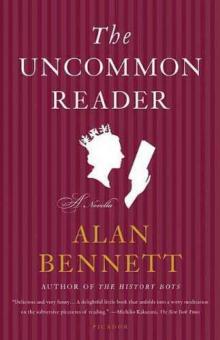 The Uncommon Reader: A Novella
The Uncommon Reader: A Novella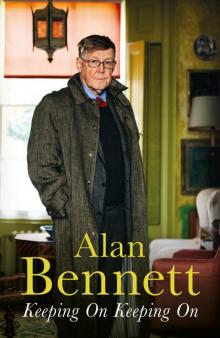 Keeping On Keeping On
Keeping On Keeping On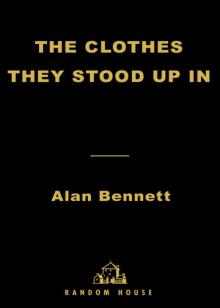 The Clothes They Stood Up In
The Clothes They Stood Up In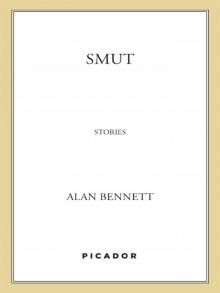 Smut: Stories
Smut: Stories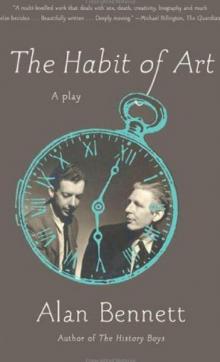 The Habit of Art: A Play
The Habit of Art: A Play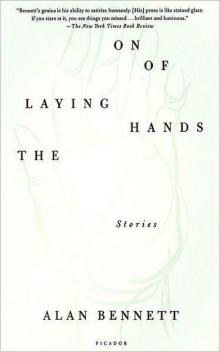 The Laying on of Hands: Stories
The Laying on of Hands: Stories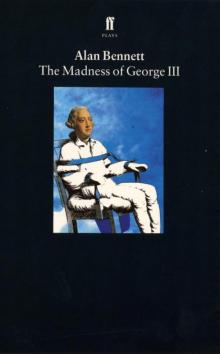 The Madness of George III
The Madness of George III Writing Home
Writing Home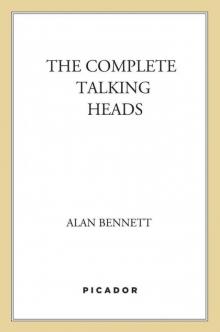 The Complete Talking Heads
The Complete Talking Heads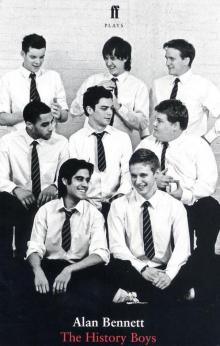 The History Boys
The History Boys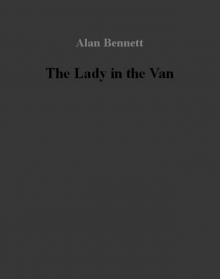 Lady in the Van
Lady in the Van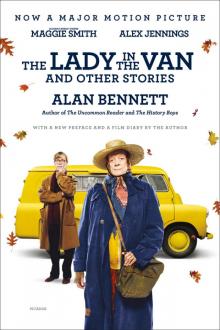 The Lady in the Van
The Lady in the Van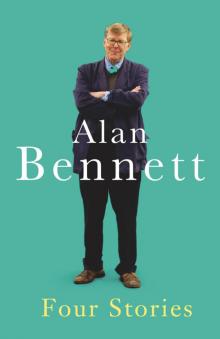 Four Stories
Four Stories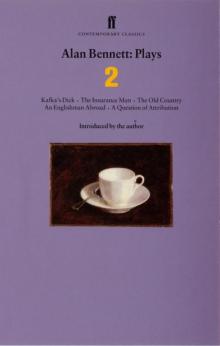 Alan Bennett: Plays, Volume 2
Alan Bennett: Plays, Volume 2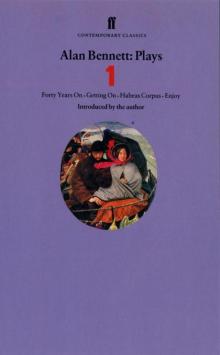 Alan Bennett: Plays, Volume 1
Alan Bennett: Plays, Volume 1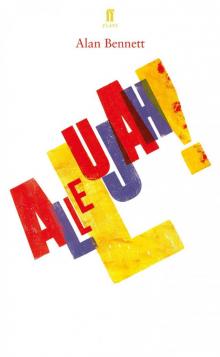 Allelujah!
Allelujah!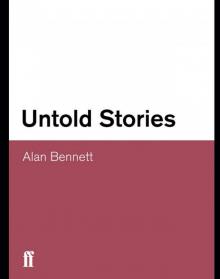 Untold Stories
Untold Stories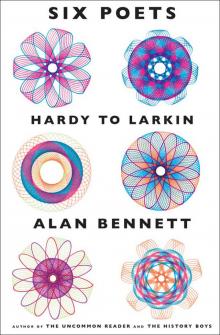 Six Poets
Six Poets